Blockchain-based elections, voice identification and online interview application
Students of the master's programs “Software Development Management” and “Development of Secure Systems and Networks” at Innopolis University helped to solve 16 tasks of IT companies.
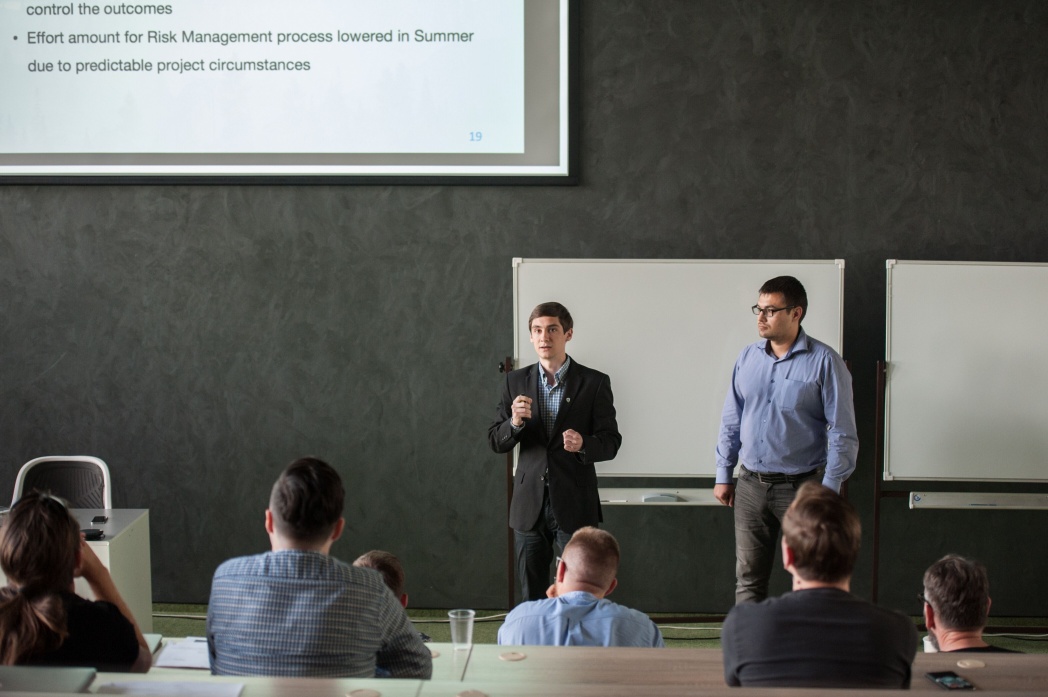
Two teams of students from Innopolis University worked at once for a famous antivirus developer. Mikhail Boldyrev and Stepan Rogonov prepared an online course, “Fundamentals of Investigation,” in which system administrators, network engineers, developers, and other IT specialists of the company study scenarios for investigating incidents in the field of information security. Students worked on practical scenarios with research on the Windows event log, creating an exact copy of a disk, analyzing a digital drive and file system, and exploring the technology for presenting information about network interactions.

Ali Abdulmadzhidov and Oleg Ilyin described for the company’s staff 4 typical cases for responding to unwanted software that people encounter. “For example, we described what an accountant should do if his computer gets infected by an advertising banner,” Ali Abdulmajidov explains.
The company’s representative, I&I intern trainee Pavel Nesterov, said that Kaspersky Lab was pleased with the work of students who showed results that met customer requirements.
Student Emil Melnikov investigated voice identification methods for the Biolink operating system. Using the biological and digital identity of the user as a key is one of the features of this operating system. Also in the framework of the project, Emil developed a prototype, which the company subsequently uses as the basis for the continuous authentication module of the operating system.
The head of product development at Biolink Ilya Yegorkin said that he liked the research approach and independence of an IT university student: “There was a very difficult moment in the work, due to which Emil got stuck and disappeared for several days. But he independently dealt with this issue, without turning to the company's specialists for help. He managed to solve the problem. ”
For Veche.io, Bogdan Vaneev and Konstantin Munichev developed a system for creating and conducting voting on the blockchain. Bogdan Vaneev singled out 5 advantages of the developed system: “It is safe - no one will delete already saved voices; open - anyone can find out if his vote has been taken into account, count votes independently and verify the results of the survey; private - real names / surnames or any other data of voters are not opened, it is only visible what this or that voter voted for; simple - we mask all the difficulties of working with the blockchain with our application and graphical interface; cheap - conducting countrywide voting through this application is cheaper than conventional voting methods. ”
Veche.io CEO Alexander Gryaznov noted independence in the search for solutions, responsibility and cohesion of the team. But, according to the customer, students need to learn to more strictly follow the schedule, more accurately plan work and roll out an integral product on their own, rather than modules.
Three students - Aidar Sabirov, Nadezhda Troflyanina and Anatoly Tykushin - did the project “Adaptation of the life cycle of developing safe software for the Sailfish OS” for the “Open Mobile Platform”. To do this, the team analyzed the existing processes during the development of the OS, developed a manual and checklists for manually checking the source code of the application, developed an automated pipeline for performing static and dynamic analysis of OS components, and introduced the developed practices into the workflow.
The company’s developer community manager, Cyril Chuvilin, praised the team for the excellent performance of the task, meeting deadlines and communication skills. He noted that the company wants to work with the university as part of industrial projects and beyond.
Artyom Bakhtin, Bulat Sayfullin and Vasily Podtikhov helped Finca collect files from network devices at customer offices around the world. “The IT infrastructure of the company is very diverse, and in order to improve its work, we identified shortcomings in the IT solutions and business process,” explains Artyom Bakhtin. Students developed a business process to add new journals with files and reduced the cost of collecting information by half. To do this, they automated configuration management on instances of the Splunk Enterprise system, which the company uses to collect data.
Rustam Abdullin, a cybersecurity analyst at the company, did not identify any disadvantages in the work of the IT university team. The customer liked how the students identified and assessed the risks and took appropriate measures; he evaluated the skills of young specialists, their ability to plan time and prioritize.
Oleg Ignatov, Evgenia Lyashenko, Rustam Gafarov and Kamil Akhiyarov made a project for the German company OWN. For their product — online whiteboards for collaboration and distributed team work — students built a platform with which people can create and add digital assistants. These assistants process large amounts of information, which an ordinary person takes a lot of time. In addition, students created two more agents: News Agent - adds news on a topic of interest to the board, Intellectual Property Agent - analyzes the intellectual property of companies (patents).
“It is difficult to imagine how much time a person will spend on processing 250 patents, and our agent spends on receiving data and processing them with graphing in less than a minute,” Oleg Ignatov comments.
According to Sebastian Denef, CEO of OWN GmbH, he did not predict how much work the team would have to do. “What the guys did is a huge and complex job: API, interaction between agents. Each member of the team contributed as far as possible. We are very pleased with the result and are glad that we are opening a company in Innopolis, in which we offered students a job, ”added Sebastian Denef.
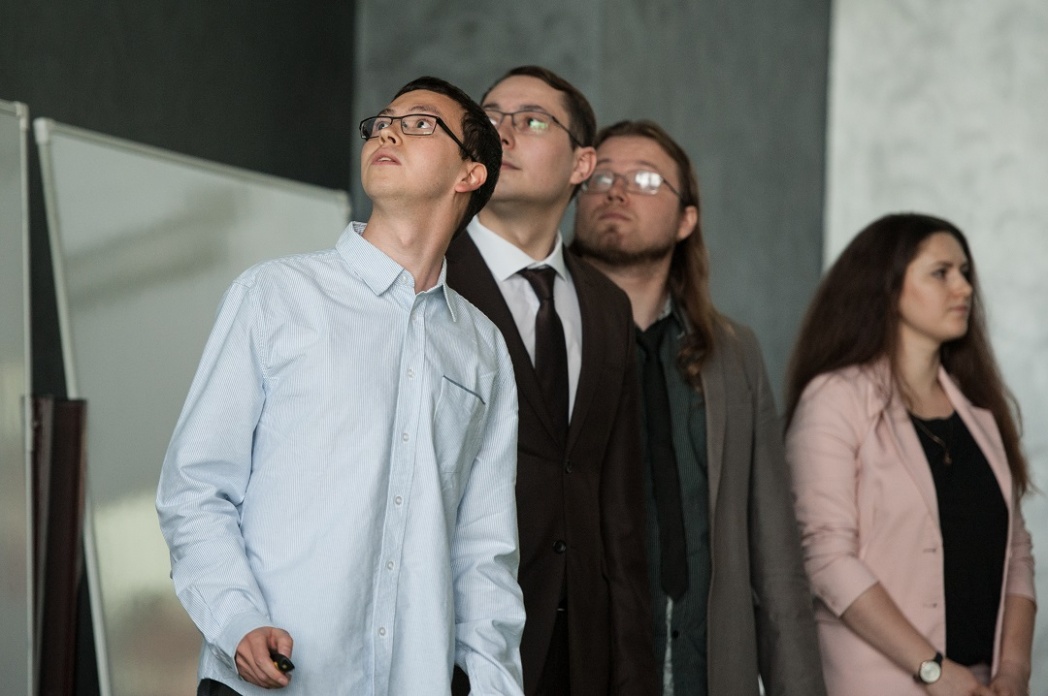
Alexander Nedorezov, Ruslan Mustafin, Alexey Merzlikin and Hayk Badalyan worked for Innosoft, the founders of which are also graduates of Innopolis University. The team did the LabelThem project, an online tool for marking objects in images. “The customer needed a system that makes the markup of objects of interest in pictures, which can be used to train neural networks (or machine learning algorithms). Previously, Innosoft hired external resources to perform this routine work, and it was expensive. The system we have implemented has reduced the customer’s costs for marking up images from $ 75 per 1000 images to $ 20 per 1000 images, that is, almost 4 times, ”says Alexander Nedorezov.
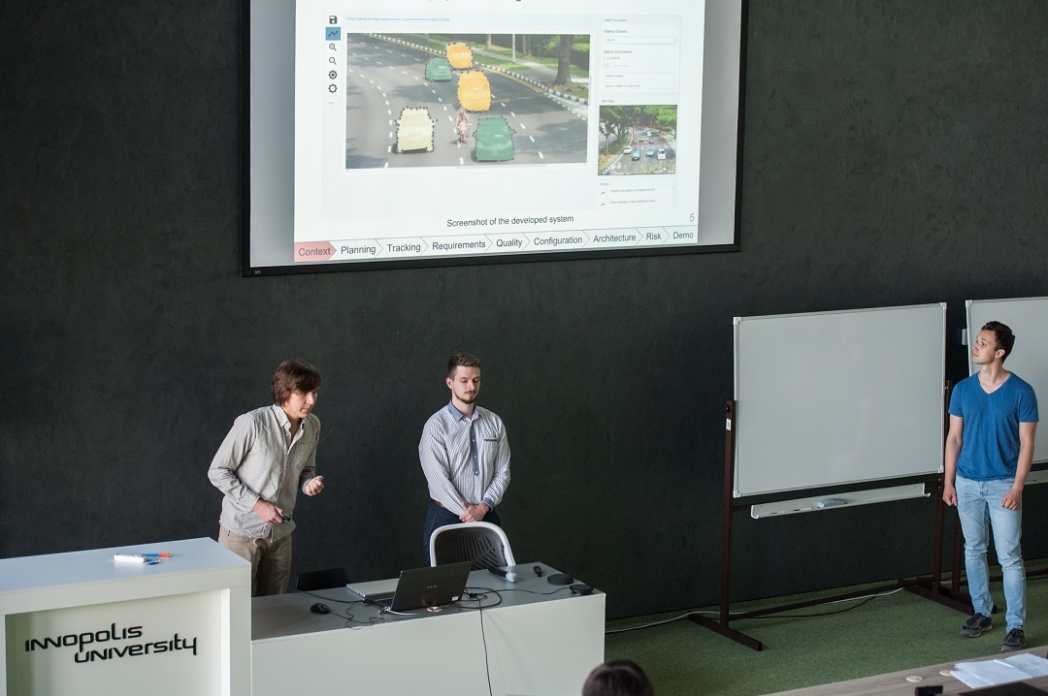
Executive Director Vyacheslav Lukin said that students quickly delved into the task assigned to them, figured out how to reduce the cost of the process and completed the work by 99%.
Anastasia Golovatenko, Ivan Zusik, Elizaveta Kasnakova, Alexander Makhnev and Bulat Mukhutdinov developed a web application for selecting candidates for work at MTS. In it, applicants leave a video message, and recruiters after watching it put down competency ratings, accept or reject candidates. The appendix compiles a table with the rating of applicants so that the company can compare them.
“With the system, the time to recruit staff is reduced, excluding the initial interview and the time to travel to the company’s office. And we added a timeline to the application with all the upcoming selection stages, so that the process is as transparent and understandable for candidates as possible, ”added Anastasia Golovatenko.
Maria Merkulova, project manager, MTS Recruitment and Hiring Department: “We are grateful to the university, whose students exceeded all our expectations. It is important for us that the selection of staff was simple and convenient, and they combined several needs for this, which was not yet on the market. ”
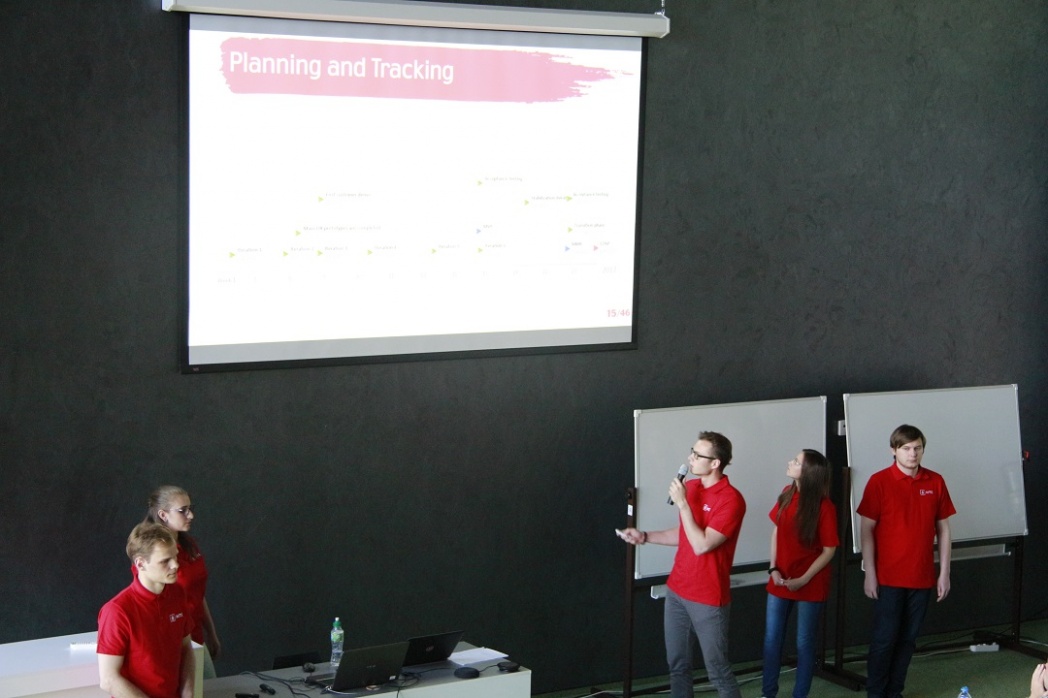
Ak Bars Bank set the task for students of Innopolis University to create a platform with which employees and customers of the bank will propose ideas for improving banking processes, vote and comment on ideas. Alexey Solovyov, Timur Shakirov, Temur Beysov and Ilya Khomyakov developed the necessary application functionality, which they placed on the bank’s servers to start testing by bank employees.
Damir Galiev, head of the bank’s innovative development project office: “We wanted to give such a task so that students could cope with it, and so that their work would not go to the shelf somewhere later. Therefore, we selected a task from our strategic program. The students did what was required of them, moreover: the bank has already launched processes to support the developed solution and create related processes. ”
From KAMAZ, Victor Vanichkov, Vladislav Dmitriev, Timur Fayzrakhmanov and Vladislav Vasiliev were given the task of developing an automated system for recording the results of audits. The system automatically creates checklists and conducts audits based on their data, draws up an audit schedule, exports checklists and audits to XLSX and generates reports on audits performed.
Pavel Dmitriev, Deputy Chairman of the KRIPS of KAMAZ PJSC, noted that the students coped with the task and the company was pleased with the results.
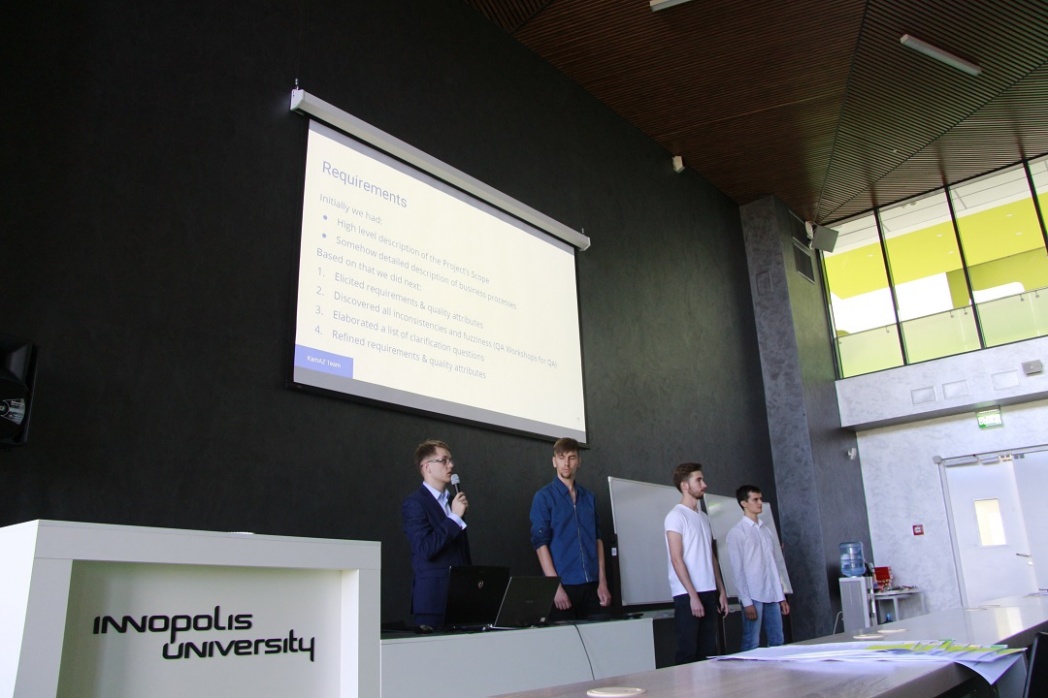
Anton Hvorov, Vyacheslav Stepanov and Ivan Dmitriev helped Flatstack, a web development company. Students have developed a system that monitors the status of sites. It notifies the user of problems in the site in any convenient way - a letter, call, SMS, message in Slack, Telegram.
Timur Wafin, Technical Director of Flatstack: “There are similar services in the world, but students offered technical solutions that made the system cheaper. During our work with students, we ourselves learned something from them. They coped with the task by 85%, there was not enough time to complete a mobile application in which users could already register and pay for services. We wish students to be more confident and persistent from us, in order to be able to say no to the customer if he is mistaken. ”

For Visiology, Alexander Simonenko, Ekaterina Sysoeva, Nikolai Yushkevich and Andrey Vystavkin developed an application for user analytics. “The company has a BI platform and a web interface, as part of an industrial project, we made a mobile client using the Xamarin.Forms framework. With him, we developed a mobile application for mobile OS - Android, iOS, Windows Mobile - using one code, ”said Nikolai Yushkevich. “The company needs such mobile applications to increase the number of users and improve the usability of the platform, but there is no business interest in supporting the project if the code is separate.”
Alexey Nikitin, head of the company’s development department: “Students are able to prioritize and quickly adapt to changing requirements. They successfully dealt with a new technology for themselves and implemented all the basic requirements. From the negative sides: all the deadlines that were set by the team were disrupted. Little time is left for testing and fixing obvious bugs. But all critical shortcomings have been fixed and the application meets the tasks. It looks damp, but I think this is acceptable for an industrial project. "
Zilya Yagafarova, Igor Bisarnov and Anton Pesegov worked on expanding the functionality of the Dooglys trade automation system using speech recognition. “Entering information into an order at the checkout is the most time-consuming and difficult part of the process: 90% of errors are made here. Our solution will improve the performance of the outlet by 30% and reduce the number of errors entered by the user during the processing of the order, ”says Zilya Yagafarova.
The team conducted a study and based on it developed and implemented a speech recognition system. According to the developers, it was necessary to teach the system to understand inaccurate cashier requests. “We worked to ensure that the program understands that“ Chocolate Cheesecake ”is“ Chocolate Cheese Cake 130g ”on the menu, so that on the word“ Apple ”it suggests the options available on the menu -“ Apple Cupcake ”,“ Apple Pie ”, “Apple strudel, given the morphological analysis,” Zilya explained.
For the P2P company’s electronic platform, which it is preparing together with Rostelecom to implement and distribute electronic textbooks in schools in Russia and the world, three students worked - Dmitry Samoilenko, Evgeny Bobrov and Ruzilya Mirgalimova. They developed an application that stylizes the look of textbooks.
P2P CEO Mikhail Savin: “Textbooks must be recognizable and unique, so we have identified a separate area of work for their design. The work was difficult and at first caused difficulties for students who still needed to work together. But in the end they managed, assigned roles in the team and quickly adapted to changes in work. ”
The IRTech company asked Liana Gareeva, Dilyar Galiev, Alexey Zhuravlev and Igor Bobko to find out how the performance of schoolchildren in Russia and the CIS countries is changing due to external factors: weather, fullness of the family, class composition, grade level and others. Students developed a visual assistant that, based on the results of these analyzes, gives advice to children and parents on how to improve school performance.
Maxim Muchkaev, Head of Innovation at IRTech, explained that the analysis results will be useful to the ministries of education and business. “We are surprised at the result of students who worked as a team of young professionals. This is the first time we have worked with students in this format and there is a desire to continue such cooperation in the future. For this, we will take into account the nuances of working with students as an example of this year’s experience in order to more clearly set the task for them, ”added Maxim Muchkaev.

Training for Kaspersky Lab employees
Two teams of students from Innopolis University worked at once for a famous antivirus developer. Mikhail Boldyrev and Stepan Rogonov prepared an online course, “Fundamentals of Investigation,” in which system administrators, network engineers, developers, and other IT specialists of the company study scenarios for investigating incidents in the field of information security. Students worked on practical scenarios with research on the Windows event log, creating an exact copy of a disk, analyzing a digital drive and file system, and exploring the technology for presenting information about network interactions.

Ali Abdulmadzhidov and Oleg Ilyin described for the company’s staff 4 typical cases for responding to unwanted software that people encounter. “For example, we described what an accountant should do if his computer gets infected by an advertising banner,” Ali Abdulmajidov explains.
The company’s representative, I&I intern trainee Pavel Nesterov, said that Kaspersky Lab was pleased with the work of students who showed results that met customer requirements.
New data protection: voice instead of password and blockchain-based elections
Student Emil Melnikov investigated voice identification methods for the Biolink operating system. Using the biological and digital identity of the user as a key is one of the features of this operating system. Also in the framework of the project, Emil developed a prototype, which the company subsequently uses as the basis for the continuous authentication module of the operating system.
The head of product development at Biolink Ilya Yegorkin said that he liked the research approach and independence of an IT university student: “There was a very difficult moment in the work, due to which Emil got stuck and disappeared for several days. But he independently dealt with this issue, without turning to the company's specialists for help. He managed to solve the problem. ”
For Veche.io, Bogdan Vaneev and Konstantin Munichev developed a system for creating and conducting voting on the blockchain. Bogdan Vaneev singled out 5 advantages of the developed system: “It is safe - no one will delete already saved voices; open - anyone can find out if his vote has been taken into account, count votes independently and verify the results of the survey; private - real names / surnames or any other data of voters are not opened, it is only visible what this or that voter voted for; simple - we mask all the difficulties of working with the blockchain with our application and graphical interface; cheap - conducting countrywide voting through this application is cheaper than conventional voting methods. ”
Veche.io CEO Alexander Gryaznov noted independence in the search for solutions, responsibility and cohesion of the team. But, according to the customer, students need to learn to more strictly follow the schedule, more accurately plan work and roll out an integral product on their own, rather than modules.
Information security for the operating system and cheaper data collection from offices around the world
Three students - Aidar Sabirov, Nadezhda Troflyanina and Anatoly Tykushin - did the project “Adaptation of the life cycle of developing safe software for the Sailfish OS” for the “Open Mobile Platform”. To do this, the team analyzed the existing processes during the development of the OS, developed a manual and checklists for manually checking the source code of the application, developed an automated pipeline for performing static and dynamic analysis of OS components, and introduced the developed practices into the workflow.
The company’s developer community manager, Cyril Chuvilin, praised the team for the excellent performance of the task, meeting deadlines and communication skills. He noted that the company wants to work with the university as part of industrial projects and beyond.
Artyom Bakhtin, Bulat Sayfullin and Vasily Podtikhov helped Finca collect files from network devices at customer offices around the world. “The IT infrastructure of the company is very diverse, and in order to improve its work, we identified shortcomings in the IT solutions and business process,” explains Artyom Bakhtin. Students developed a business process to add new journals with files and reduced the cost of collecting information by half. To do this, they automated configuration management on instances of the Splunk Enterprise system, which the company uses to collect data.
Rustam Abdullin, a cybersecurity analyst at the company, did not identify any disadvantages in the work of the IT university team. The customer liked how the students identified and assessed the risks and took appropriate measures; he evaluated the skills of young specialists, their ability to plan time and prioritize.
Digital assistants in processing large amounts of information
Oleg Ignatov, Evgenia Lyashenko, Rustam Gafarov and Kamil Akhiyarov made a project for the German company OWN. For their product — online whiteboards for collaboration and distributed team work — students built a platform with which people can create and add digital assistants. These assistants process large amounts of information, which an ordinary person takes a lot of time. In addition, students created two more agents: News Agent - adds news on a topic of interest to the board, Intellectual Property Agent - analyzes the intellectual property of companies (patents).
“It is difficult to imagine how much time a person will spend on processing 250 patents, and our agent spends on receiving data and processing them with graphing in less than a minute,” Oleg Ignatov comments.
According to Sebastian Denef, CEO of OWN GmbH, he did not predict how much work the team would have to do. “What the guys did is a huge and complex job: API, interaction between agents. Each member of the team contributed as far as possible. We are very pleased with the result and are glad that we are opening a company in Innopolis, in which we offered students a job, ”added Sebastian Denef.

Alexander Nedorezov, Ruslan Mustafin, Alexey Merzlikin and Hayk Badalyan worked for Innosoft, the founders of which are also graduates of Innopolis University. The team did the LabelThem project, an online tool for marking objects in images. “The customer needed a system that makes the markup of objects of interest in pictures, which can be used to train neural networks (or machine learning algorithms). Previously, Innosoft hired external resources to perform this routine work, and it was expensive. The system we have implemented has reduced the customer’s costs for marking up images from $ 75 per 1000 images to $ 20 per 1000 images, that is, almost 4 times, ”says Alexander Nedorezov.

Executive Director Vyacheslav Lukin said that students quickly delved into the task assigned to them, figured out how to reduce the cost of the process and completed the work by 99%.
Systems for working with clients and job candidates
Anastasia Golovatenko, Ivan Zusik, Elizaveta Kasnakova, Alexander Makhnev and Bulat Mukhutdinov developed a web application for selecting candidates for work at MTS. In it, applicants leave a video message, and recruiters after watching it put down competency ratings, accept or reject candidates. The appendix compiles a table with the rating of applicants so that the company can compare them.
“With the system, the time to recruit staff is reduced, excluding the initial interview and the time to travel to the company’s office. And we added a timeline to the application with all the upcoming selection stages, so that the process is as transparent and understandable for candidates as possible, ”added Anastasia Golovatenko.
Maria Merkulova, project manager, MTS Recruitment and Hiring Department: “We are grateful to the university, whose students exceeded all our expectations. It is important for us that the selection of staff was simple and convenient, and they combined several needs for this, which was not yet on the market. ”

Ak Bars Bank set the task for students of Innopolis University to create a platform with which employees and customers of the bank will propose ideas for improving banking processes, vote and comment on ideas. Alexey Solovyov, Timur Shakirov, Temur Beysov and Ilya Khomyakov developed the necessary application functionality, which they placed on the bank’s servers to start testing by bank employees.
Damir Galiev, head of the bank’s innovative development project office: “We wanted to give such a task so that students could cope with it, and so that their work would not go to the shelf somewhere later. Therefore, we selected a task from our strategic program. The students did what was required of them, moreover: the bank has already launched processes to support the developed solution and create related processes. ”
Systems for audit, business analytics and site monitoring
From KAMAZ, Victor Vanichkov, Vladislav Dmitriev, Timur Fayzrakhmanov and Vladislav Vasiliev were given the task of developing an automated system for recording the results of audits. The system automatically creates checklists and conducts audits based on their data, draws up an audit schedule, exports checklists and audits to XLSX and generates reports on audits performed.
Pavel Dmitriev, Deputy Chairman of the KRIPS of KAMAZ PJSC, noted that the students coped with the task and the company was pleased with the results.

Anton Hvorov, Vyacheslav Stepanov and Ivan Dmitriev helped Flatstack, a web development company. Students have developed a system that monitors the status of sites. It notifies the user of problems in the site in any convenient way - a letter, call, SMS, message in Slack, Telegram.
Timur Wafin, Technical Director of Flatstack: “There are similar services in the world, but students offered technical solutions that made the system cheaper. During our work with students, we ourselves learned something from them. They coped with the task by 85%, there was not enough time to complete a mobile application in which users could already register and pay for services. We wish students to be more confident and persistent from us, in order to be able to say no to the customer if he is mistaken. ”

For Visiology, Alexander Simonenko, Ekaterina Sysoeva, Nikolai Yushkevich and Andrey Vystavkin developed an application for user analytics. “The company has a BI platform and a web interface, as part of an industrial project, we made a mobile client using the Xamarin.Forms framework. With him, we developed a mobile application for mobile OS - Android, iOS, Windows Mobile - using one code, ”said Nikolai Yushkevich. “The company needs such mobile applications to increase the number of users and improve the usability of the platform, but there is no business interest in supporting the project if the code is separate.”
Alexey Nikitin, head of the company’s development department: “Students are able to prioritize and quickly adapt to changing requirements. They successfully dealt with a new technology for themselves and implemented all the basic requirements. From the negative sides: all the deadlines that were set by the team were disrupted. Little time is left for testing and fixing obvious bugs. But all critical shortcomings have been fixed and the application meets the tasks. It looks damp, but I think this is acceptable for an industrial project. "
Digital assistant at the checkout
Zilya Yagafarova, Igor Bisarnov and Anton Pesegov worked on expanding the functionality of the Dooglys trade automation system using speech recognition. “Entering information into an order at the checkout is the most time-consuming and difficult part of the process: 90% of errors are made here. Our solution will improve the performance of the outlet by 30% and reduce the number of errors entered by the user during the processing of the order, ”says Zilya Yagafarova.
The team conducted a study and based on it developed and implemented a speech recognition system. According to the developers, it was necessary to teach the system to understand inaccurate cashier requests. “We worked to ensure that the program understands that“ Chocolate Cheesecake ”is“ Chocolate Cheese Cake 130g ”on the menu, so that on the word“ Apple ”it suggests the options available on the menu -“ Apple Cupcake ”,“ Apple Pie ”, “Apple strudel, given the morphological analysis,” Zilya explained.
Developments for students around the world
For the P2P company’s electronic platform, which it is preparing together with Rostelecom to implement and distribute electronic textbooks in schools in Russia and the world, three students worked - Dmitry Samoilenko, Evgeny Bobrov and Ruzilya Mirgalimova. They developed an application that stylizes the look of textbooks.
P2P CEO Mikhail Savin: “Textbooks must be recognizable and unique, so we have identified a separate area of work for their design. The work was difficult and at first caused difficulties for students who still needed to work together. But in the end they managed, assigned roles in the team and quickly adapted to changes in work. ”
The IRTech company asked Liana Gareeva, Dilyar Galiev, Alexey Zhuravlev and Igor Bobko to find out how the performance of schoolchildren in Russia and the CIS countries is changing due to external factors: weather, fullness of the family, class composition, grade level and others. Students developed a visual assistant that, based on the results of these analyzes, gives advice to children and parents on how to improve school performance.
Maxim Muchkaev, Head of Innovation at IRTech, explained that the analysis results will be useful to the ministries of education and business. “We are surprised at the result of students who worked as a team of young professionals. This is the first time we have worked with students in this format and there is a desire to continue such cooperation in the future. For this, we will take into account the nuances of working with students as an example of this year’s experience in order to more clearly set the task for them, ”added Maxim Muchkaev.
